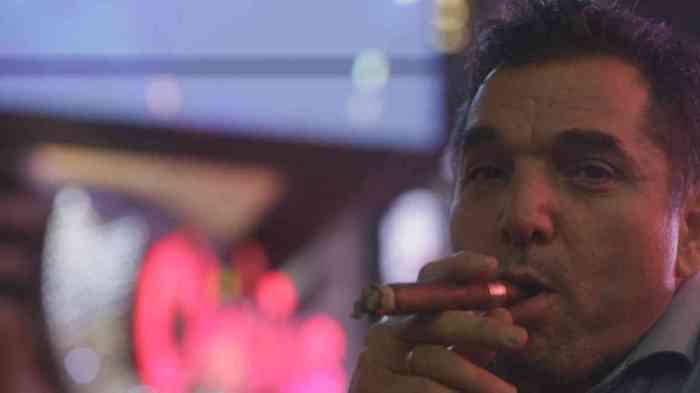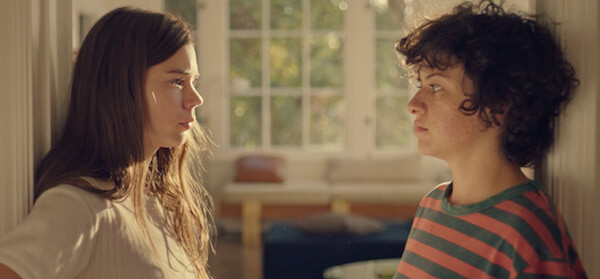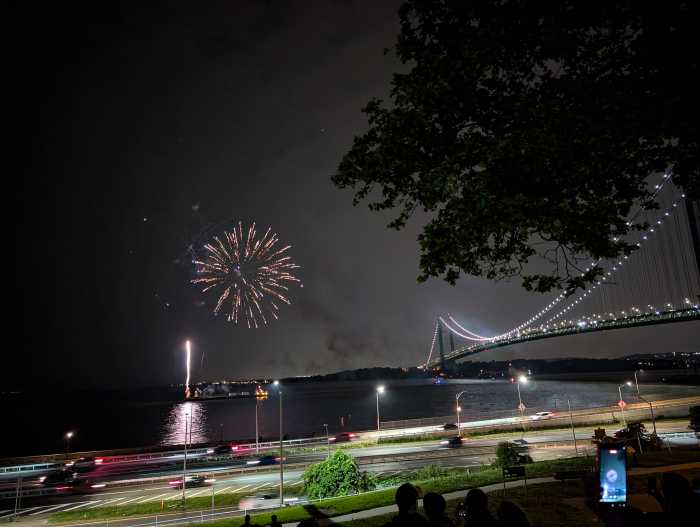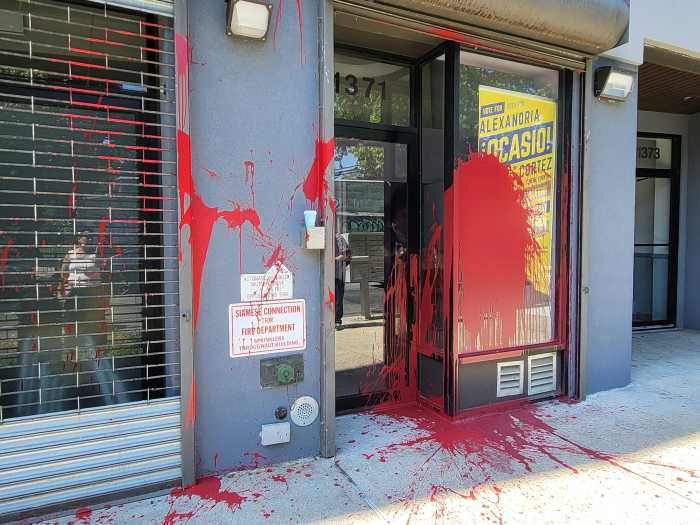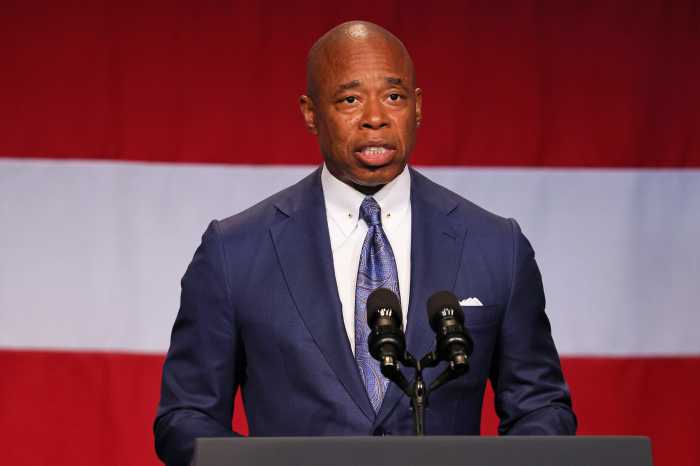Iggy Malmborg and Saga Becker in Ester Martin Bergsmark’s “Something Must Break.” | TRIBECA FILM FESTIVAL
BY GARY M. KRAMER | In a queer year at the Tribeca Film Festival, one of the highlights was the arresting Swedish film “Something Must Break,” written and directed by Ester Martin Bergsmark. Sebastian (Saga Becker) is an effeminate man whose roommate Lea (Shima Niavarani) tells him he “needs a good fuck.” He finds that and more in Andreas (Iggy Malmborg), a man who saves him from a beating in a men’s room one night.
Sebastian is so smitten by Andreas he saves his hero’s bloodied tissue. By the way the two men look at each other, we can see they are falling in love. Grabbing a beer together, dancing a tango on a roof, and getting into adventures like tying up a guy and robbing him deepen their bond. When Andreas checks Sebastian for ticks, it is an extremely erotic encounter complete with rimming and splatters of cum.
In a broad offering of queer films, fluidity of identity a recurring theme
When Sebastian begins to spy on Andreas and follow him, Andreas asserts, “I’m not gay.” “Me either,” replies Sebastian, who now wants to be known as Ellie. When Sebastian, as Ellie, looks in a mirror, checking himself out in a dress and fixing his hair, we learn more about the man who says he must destroy himself to become his “dream sister” Ellie. These moments are powerful, as is a stunningly beautiful, even if shocking, slow-motion scene of Ellie being pissed on as Peggy Lee plays on the soundtrack.
Candid, graphic eroticism elevates the romance between Ellie and Andreas, but it’s the film’s presentation of gender and sexual identity issues that truly resonates.
Pit Bukowski in Till | Kleinert’s “Der Samurai.”TRIBECA FILM FESTIVAL
Another gender-bending as well as genre-bending film is “Der Samurai.” This imaginative horror film concerns Jakob, (Michel Diercks), a repressed cop in a small German village hunting a wolf on the loose. When he accepts a package — a Samurai sword — on behalf of the title character (Pit Bukowski), a man who wears a white dress, a strange and sinister pas de deux begins between these two very different men. Jakob chases Der Samurai and they wrestle and even dance together. The latter scene occurs while one of Der Samurai’s victims is gagged and hanging upside down nearby.
Writer/ director Till Kleinert’s peculiar film, his debut, is a potent and sexually charged allegory, full of queer symbolism. While some of the symbolism, like an erection one of the characters sports in the film’s climax, is obvious, much of the film is open to interpretation. This is perhaps what makes it so intriguing.
Sexual fluidity is addressed in “X/ Y,” a glossy drama about a quartet of New Yorkers in a variety of tenuous relationships. This urban romance unfolds almost as if it were a series of short films with interconnected characters. Silvia (America Ferrera) and Mark (writer/ director Ryan Piers Williams) separate in the opening scene, prompting him to move in with his buddy Jake (Jon Paul Phillips). In the course of sorting out what they want and whom they want to love, the two men share a night of passion that may lead to more for one of them. Meanwhile, Silvia and her friend Jen (Melonie Diaz) make a series of bad decisions, but ones that help them become more self-aware.
“X/Y” operates in a movie universe where characters live better than they might in real life, but the emotions on display are authentic and the performances by the entire ensemble cast are ingratiating.
Susan Sontag as seen in Nancy Kates’ documentary about her life and work. | TRIBECA FILM FESTIVAL
This year’s festival featured an impressive number of non-fiction films. “Regarding Susan Sontag” was an appropriately respectful and reflective documentary about the late writer, essayist, and filmmaker, an elegant tribute that resisted the impulse to become hagiography. Featuring seamlessly woven together interview clips, photographs, and animation, as well as snippets of Sontag’s writing — read by actress Patricia Clarkson — this lovingly made film captures the truth if not the precise essence of its prickly subject.
Director/ co-writer Nancy Kates chronicles Sontag from her early years of marriage and motherhood, which were upended by the independence she found living in France. The film focuses on some of her most influential writings — from her pointed observations on camp, photography, and feminism to her groundbreaking ideas about illness, AIDS, and 9/ 11. “Regarding Susan Sontag” also describes the writer’s relationships with famous women, including Nicole Stéphane, Lucinda Childs, and Annie Leibovitz.
This is not a sentimental portrait but a vibrant examination of a woman whose life helped define late 20th century American intellectual culture. There are interesting remarks from friends and former lovers — especially Harriet Sohmers Zwerling — but the most poignant comments come from her younger sister, who had a heart to heart with Sontag as the writer was near the end of her life.
Tribeca also offered an excellent shorts program this year, with two queer entries among the standouts. One priceless short was Brian Bolster’s documentary “One Year Lease.” Shot in a New York apartment, the film depicts a series of answering machine messages left by a gay couple’s distinctively voiced landlady. The film will resonate with any New Yorker who has had trouble with busybodies, as well as with leaks and other tenant maladies.
Coy Middlebrook’s sensitive road movie “For Spacious Sky” chronicles the bond among three very different brothers, one of whom (played by out actor Jonah Blechman) is gay. The story, set on the eve of Obama’s election, explores themes of tolerance and acceptance.
There were at least another dozen films with queer characters or content at this year’s festival, including “Starred Up,” a gritty prison drama about a father and son in the same jail, and “The Bachelor Weekend,” about a stag party that has the groom’s gay brother and his partner romping around naked in the woods.
Gay filmmaker Tsai Ming-liang’s extraordinary “Journey to the West” was a hypnotic, hour-long experimental film that documents a monk (Lee Kang-sheng) walking s-l-o-w-l-y through Marseilles. Full of breathtaking visuals and emotional power, this was arguably the best film at the Tribeca Film Festival this year.




